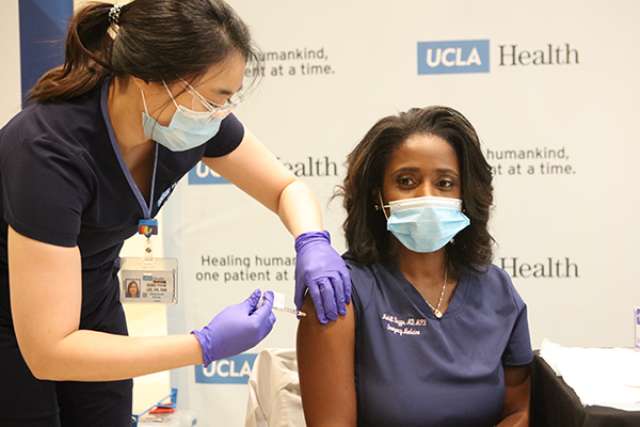In a burst of jubilance at UCLA Health – an emotional release after months of pandemic trauma – frontline health care workers began receiving the Pfizer COVID-19 vaccinations on Wednesday. It was perhaps the most visible sign of hope since the pandemic struck the U.S. early this year.
Staff members applauded and cheered "Woo-hoo!" as the first shots were administered at Ronald Reagan UCLA Medical Center, in a large room with booths lined with plastic to separate patients.
Mylar balloons hinted at the celebratory nature of the moment.
"This is better than medical school graduation," said Russell Johnson, MD, a UCLA Health physician who works in internal medicine and pediatrics, as applause broke out after he was injected with the first dose of a two-part vaccine.
Emergency physician Medell Briggs-Malonson, MD, MPH, was the first at UCLA Health to receive the vaccine Wednesday morning. Any nerves she felt about going first evaporated when she arrived at the hospital.
"I had a couple of butterflies, but then actually coming down and really realizing this was going to be the first shot and the first vaccine and then we can hopefully start to return to normalcy, it took all the flutters away," Dr. Briggs-Malonson said. "I'm incredibly excited, I'm very optimistic. I can't wait to see our country come back to a better new normal."
About 480 health care workers were expected to be vaccinated at UCLA Health on Wednesday. Many arrived early for their appointments, full of anticipation.
"I was like, 'Please, let me go first! I’m so excited,'" said Nicole Chang, RN, who works in the COVID-19 unit at UCLA Health Santa Monica Medical Center. "It's just been a really long year for everybody and I think this is an opportunity for us to heal together and finally get back on track to normalcy. I miss seeing people smile! I miss seeing people's faces. I miss hugging my grandma. Those are all motivating factors as to why I want to get this vaccine."
Chang, who was second in line for the vaccine, said she barely felt a thing during the injection: "It felt like nothing. I didn't even feel a pinch!" Besides, she said, "A pinch is nothing compared to what these people go through (with COVID-19). I’ve seen the devastation it causes."
The vaccine from Pfizer and BioNTech — the first to receive emergency use authorization from the U.S. Food and Drug Administration — is part of a nationwide immunization effort that many hope represents the beginning of the end of a global pandemic that has caused widespread illness, death, economic strife and social upheaval.
The vaccine requires two doses, given 21 days apart for full efficacy.
A second vaccine, from drugmaker Moderna, is expected to receive emergency use authorization from the FDA in the coming days. It also requires two doses. Several other vaccine candidates are undergoing clinical trials in the US.
The novel coronavirus known as SARS-CoV-2 has killed more than 1.6 million people worldwide, including more than 300,000 in the United States and 21,200 in California.
A cure for the virus has yet to be discovered, though multiple treatment trials are underway.
One antiviral drug, remdesivir, has been approved by the FDA to treat hospitalized patients and two other therapies – monoclonal antibodies from drug companies Eli Lilly and Regeneron – have received emergency use authorization for outpatient COVID-19 cases.
The Pfizer and Moderna vaccines use technology that has never been employed in vaccines before. Rather than relying on inactivated or weakened virus strains, as many common vaccines do, these use messenger RNA (mRNA) technology, which tells cells to produce a protein that stimulates an immune response to COVID-19 without exposure to the disease.
Eunice Lee, RN, BSN, administered the first shots to UCLA Health staff on Wednesday — a break from her work in the intensive care unit with COVID-19 patients.
"I'm a little nervous," she said before administering the first injection to Dr. Briggs-Malonson. "But very honored. It's very hopeful and I'm so thankful.



